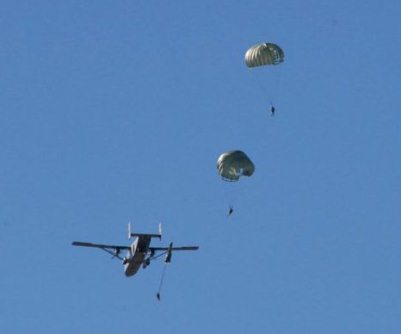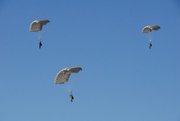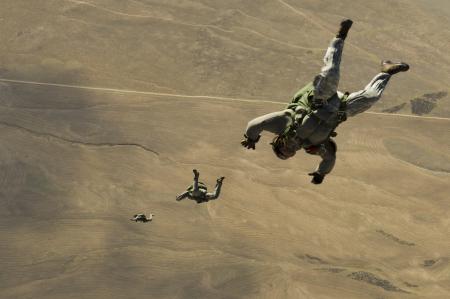|
Home > Special Forces
Training
Special Forces training is long and hard.
There are several phases of training to go through before one becomes a
"Green Beret". The training for National Guard Soldiers is the same,
just as long, and just as hard as for active duty Soldiers. In fact,
it is the same training course. All training in the Special Forces
Qualification Course (SFQC) takes place at Fort
Bragg, North Carolina except for some specialized medical training.
Advanced Special Forces training takes place at Fort Bragg and other
locations as well.
Prior to starting the Special Forces training
'pipeline' one must have completed Basic Training, Advanced Individual
Training (AIT), and Airborne School. There are other requirements as well
to include the ability to get a SECRET security clearance and a GT score
of 107 or higher.
Special Forces Readiness Evaluation (SFRE)
The many different National Guard Special Forces
spread across the United States will conduct home-station in-unit
evaluations of Soldiers prior to sending them to Fort Bragg, North
Carolina for Special Forces Assessment and Selection (SFAS). These
evaluations are designed to determine if a Soldier is ready for the
intense training ahead of them. View a
video about SFRE.
Special Operations Preparation Course (SOPC)
This 3-week course prepares Soldiers for the Special Forces Assessment and
Selection course. It provides instruction in physical training, land
navigation, and other common tasks.
Special Forces Assessment and Selection (SFAS)
This course is about three weeks long. You are
mentally and physically stressed and evaluated by Special Forces
instructors for suitability to continue training in Special Forces.
This is the course that assesses and selects Soldiers for attendance at
the Special Forces Qualification Course (SFQC). Soldiers are selected based
on attributes such as intelligence, trainability, physical fitness,
motivation, judgement, and influence. SFAS is both physically,
mentally, and emotionally demanding - your body and mind are tested in a
variety of situations and circumstances. You are assessed on your
tactical skills, physical fitness, ability to cope with stressful events,
and leadership abilities. Some of the activities include rucksack
marches, team events, land navigation, small unit tactics, obstacle
courses, swim tests, and physical fitness tests.
Get
Selected for Special Forces. A book by LTC Joe Martin, 2005.
https://www.amazon.com/Get-Selected-Special-Forces-Successfully/dp/0975355279
SF Assessment and Selection Forum - Professional Soldiers
http://www.professionalsoldiers.com/forums/forumdisplay.php?f=26
Special Operations Selection Preparation Forum - ShadowSpear
https://shadowspear.com/vb/forums/special-operations-selection-preparation.51/
Pre-SFAS Workout - California Army National Guard
https://enlistspecialforces.wordpress.com/sf-training-pipeline/preparing-for-sfas/
Special Forces Candidate (18X). A video describing requirements for entry
into Special Forces training as an 18X.
www.youtube.com/watch?v=I2KoUgFxCuE
Special Forces Qualification Course (SFQC)
This course is a series of phases that include
land navigation, small unit tactics, MOS training (engineer/demo, weapons,
medic, communications), individual training, collective training, and
language and culture training. The SFQC is under constant revision
incorporating the latest techniques in training and ensuring that the
course remains relevant to the Special Forces groups. Currently
there are six phases:
Phase I: Special Forces Orientation Course.
This two-week phase introduces the students to the Special Forces mission,
training, career paths, and history.
Phase II: Language and Culture. This
phase is usually 18-24 weeks long and can be longer based on advanced
language requirements.
Phase III: SF Individual
Training. This phase is 12 weeks long and is comprised of SF CST,
land navigation, SERE-C, and other individual skills.
Phase IV: SF MOS Training. This is
where the Soldier learns his individual Special Forces Military
Occupational Specialty (MOS). The training is 14 weeks long for 18A, 18B, 18C,
and 18E MOSs and 46 weeks long for 18D (SF Medic). See more info on the SF
MOS of
18A,
18B,
18C,
18D, and
18E.
Phase V: Special Forces Unconventional Warfare (UW)
Culmination Exercise (CULEX
Robin
Sage) is four weeks long.
Phase VI: Graduation consists of outprocessing and
the graduation ceremony.
MOS Training. Each Soldier is trained in a
Special Forces MOS - Engineer, Weapons, Medic, or
Communications. For a description of each MOS see the link below:
https://www.goarmy.com/special-forces/team-members.html
U.S. Army Special Forces Selection and Training by
Wikipedia
https://en.m.wikipedia.org/wiki/Special_Forces_selection_and_training
Special Forces.
By U.S. Army Special Operations Recruiting.
This could be considered the "official" website for Army Special Forces
recruiting. It should have the most up to date information for
Special Forces selection and training as well as for those interested in
entering Special Forces on active duty status; rather than National Guard
Special Forces.
https://goarmysof.com/specialforces/sfrecruiting.html
The Special Forces Qualification Course culminates
in a unconventional warfare exercise called "Robin Sage" where students
must interact with elements of a resistance group to include a guerrilla
band in a rural environment. See "World's Foremost Unconventional
Warfare Exercise Turns 35", Special Warfare Magazine, March -
April 2009, Volume 22, Issue 2).
Army Special Forces Training - Military.com
https://www.military.com/special-operations/army-special-forces-training.html
Special Forces "Q" Course - Inside Special Forces
https://enlistspecialforces.wordpress.com/sf-training-pipeline/special-forces-q-course/
Special Forces Language Training
Each Soldier must learn a
language as part of the Special Forces Qualification Course. Special
Forces Soldiers study a number of different languages. Language
training is generally six months long although more difficult languages
may be longer. Most language training takes place at Fort Bragg
while in the qualification course. The language you will study
depends on your unit of assignment. Each Special Forces unit - whether
active duty or National Guard - is assigned a regional area of the world
to focus on; although all units continually deploy to Iraq and
Afghanistan. If you are in a unit that is aligned to PACOM then you
are studying a language from the Pacific basin. If you are in a unit
aligned with SOUTHCOM then you will be learning Spanish. Other units are
aligned with CENTCOM and Arabic will be the language you will learn. Learn
more about
Special Forces Language Training.
Once the Soldier has completed his initial training
and he is assigned to a detachment he will take part in language refresher
and advanced training. This additional language training can be two weeks
to six months long. Locations are likely the home station of the unit
although many times Soldiers will go overseas for immersion training in
foreign countries. Along with learning the language SF Soldiers also
learn a nation's culture, history, geography and other aspects of that
society. Some Soldiers who have a special aptitude for languages are
afforded the opportunity to attend the
Defense
Language Institute Foreign Language Center at the Presidio of Monterey
in Monterey, California.
Special Operations Forces Teletraining System
(SOFTS). One method of learning or remaining proficient in a
language is taking part in SOFTS.
https://www.softsonline.org/
Survival, Evasion, Resistance, and Escape (SERE)
Special Forces candidates are required to
attend the SERE Level C course as part of their training. The course
teaches the student how to evade capture,
survival skills during evasion, survival skills during captivity, methods
of resistance in captivity, and of methods of escape. Other topics such as
the military code of conduct are taught as well. A detailed look at
SERE training can be found on the Special Forces Training web site at the following
link -
Survival Evasion Resistance Escape SERE training.
Advanced Special Forces Training
Special Operators continue their training all through their careers.
There are many additional skills required beyond training received in the
Special Forces Qualification Course (SFQC) for an SF Soldier to be a
contributing member of an operational detachment. Some advanced
courses available to Special Forces Soldiers include:
Special Forces Sniper Course
(SFSC)
Special Forces Combat Diver Course
Special Forces Combat Dive Supervisor Course
Special Forces Diving
Medical Technician
Jumpmaster Course
Pathfinder Course
Ranger
School
Special Forces Military Freefall Parachutist Course (HALO)
Military Free Fall Jumpmaster Course
Advanced Special Operations
Techniques (ASOT)
Special Operations Terminal Attack Course (SOTAC)
Special Forces Intelligence Sergeant (18F)
Special Forces Warrant
Officer (180A)
Personnel Recovery
Special Forces Mountaineering
SOF Sensitive Site Exploitation Operator
Special Forces Technical
Surveillance
Unconventional Warfare Operational Design
Special Forces Advanced Urban Combat (SFAUC)
SFARTAETC
Click here for a comprehensive listing of
Special Forces advanced skills training.
Environmental Training. Special Forces Soldiers are
trained to operate in waterborne, desert, jungle, mountain and
arctic environments usually during detachment level training events.
Infiltration Techniques. Special Forces operational
detachments may have to infiltrate into denied or enemy-held areas.
The SF teams are provided advanced training to accomplish infiltration by
air, land or sea. SF Soldiers continue to conduct
airborne training
throughout their assignment to Special Forces units. The picture below left shows a static line parachute
operation while the picture below right shows a High Altitude Low Opening
parachute operation (photos by 20th SFGA).



Members of the 19th Special Forces Group
conduct
a HALO parachute jump
in March 2012.
(Photo by Staff Sgt. Stephany
Richards of 2nd Combat Camera Squadron).
Special Forces Combat Diver School. The Special Forces Combat Diver School is located on
Key West, Florida. It is one of the hardest schools offered by the
Army. Click here to find out more about the
Special Forces Combat Diver Course. There
are many skills learned by SF Combat Divers on combat dive teams to
include water jumps, helocast,
and small boat operations.
18F - Intelligence Sergeant. The fifth enlisted MOS
on a Special Forces detachment is the Intelligence Sergeant. This is
a senior SF NCO (E7) who has already served a number of years on an ODA.
The 18F MOS is awarded after successful completion of the Special Forces
Intelligence Sergeant Course at Fort Bragg.
180A - Special Forces Warrant Officer. SF Warrant
Officers are combat leaders and staff officers who manage all aspects of
Special Forces operations in all operational environments. The SF WO
participates in joint, strategic, operational and tactical requirements at
all levels of planning and execution of special operations worldwide.
The SF WO is responsible for conducting unconventional warfare and the
integration of Special Forces tactics and techniques into all operations.
In the absence of the detachment commander they assume command of the
detachment. They function as the detachment commander of a
split-team when the ODA divides to perform multiple missions. To be
a SF WO you must be an E-6, hold an SF MOS, and have served on an ODA for
at least 3-5 years. Special Forces Warrant Officers do not attend
Warrant Officer Candidate School (WOCS) at Fort Rucker, AL as that
curriculum is part of the SF Warrant Officer Tactical and Technical
Certification Course (WOTTC). WOTTC Course is 20 weeks long and is held
twice a year.
https://nationalguardspecialforces.com/180A.html
National Guard Warrant Officer Career Information
https://www.nationalguard.com/become-a-warrant-officer
Joint Special Operations University (JSOU). This
school is located at MacDill Air Force Base at USSOCOM and delivers unique
SOF educational opportunities through its residence course program.
The JSOU mission is to educate Special Operations Forces senior and
intermediate leaders (officers and NCOs) in the science and art of Joint
Special Operations.
https://www.socom.mil/JSOU/Pages/default.aspx
Specialized Civilian Schools and Training. Green Berets
receive some of their training from specialized civilian schools -
especially in the fields of combatives course, combat pistol shooting
classes, and
security
driving schools.
Other Sources of
Information for Special Forces Training
Special Forces Training - Go Army.com
https://www.goarmy.com/special-forces/training.html
United States Army Special Forces Selection and Training.
Wikipedia.
https://en.wikipedia.org/wiki/Special_Forces_selection_and_training
The SF Pipeline. A forum about Special Forces training on the
"Professional Soldiers" website. Ask questions and get answers.
http://www.professionalsoldiers.com/forums/forumdisplay.php?f=25
To add information, correct information, or report
broken links on this page please contact the webmaster at:
info@nationalguardspecialforces.com
|


